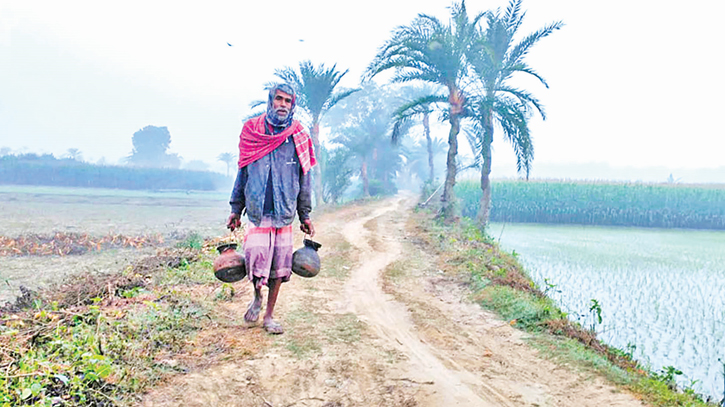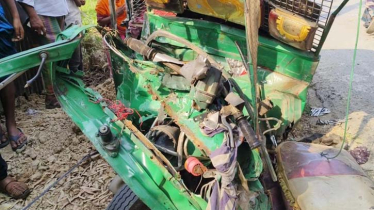
A man carries date palm juice in two earthen pots on a chilly morning. Photo : Messenger
In times past, the markets for date palm juice and molasses were centred around villages. However, with a growing preference for jaggery as a healthier alternative to sugar, the demand for this traditional sweetener has surged in city markets.
The allure of jaggery, much like date juice, is particularly pronounced during the winter season. Among the various offerings, the 'Jash Date Palm Juice of Jashore' stands out, deeply rooted in tradition with a rich historical significance dating back to ancient times when palm trees and molasses were first renowned in Jashore.
As the first light breaks at 6 o'clock in the morning, individuals like Abuzar Rahman, Rafiqul Islam, Tauhidur Rahman, Ohidul Islam, and Azizur Rahman, who are cousins, embark on a journey to the fields after the Fazr prayers. Their mission is to collect juice from palm trees. The ritual continues with the morning task of boiling the juice, producing molasses, and transporting it to the market.
This picturesque scene unfolds in Bhagbanpur village, nestled in the Narayanpur union of Chowagacha upazila in Jashore. A visit to this village reveals a landscape where nearly every household is engaged in the process, burning juice in stoves of various sizes. The majority of the village men not only focus on agriculture but also partake in horticulture, specifically cutting palm trees.
The juice is carefully brought down from the palm trees, transported home, and then poured into large pots in the courtyard. A slow simmer and continuous stirring transform the raw juice into 'jhola gur' and 'patali gur,' a process that takes approximately two to two and a half hours. The resulting molasses attract buyers from distant places, some of whom rent spaces in the local bazaar to sell this coveted product.
As the season for tree cutting and sap collection commenced in November 2023, the initial yield was affected by the mild winter. However, with the intensification of winter in the second week of January, the juice flow increased, bringing profit and satisfaction to the tree climbers, meeting the demands of jaggery enthusiasts.
Rafiqul Islam from Ilishmari village shares his experience, stating, "We work as daily wage workers during other times of the year. In this winter season, palm trees are cut down to collect sap. My cousins have also retained this profession."
He continues, "I have 35 trees here. I sell molasses by charging 5 to 6 per day. Varieties of jaggery are sold from Tk 300 to Tk 500. The juice is sold at Tk 200 to Tk 250 per load."
In Bhagbanpur village, the sweet aroma of juice fills the air each morning. After the jaggery is boiled on stoves, children gather around to indulge in sweet treats with sticks and spoons, turning each morning into a festive occasion.
Tree climbers, locally known as 'Gachira,' play a vital role. Bidhan Ghosh, a teacher, emphasises the changing dynamics of the profession, stating, "Daughters and grandchildren have come to the house. They wanted to eat juice and jaggery. Now I have come to take juice and molasses. Currently, no one wants to join this profession of cutting trees. So getting juice and jaggery has become scarce."
Ohidul Islam of Bhagbanpur village, with 43 trees to his name, acknowledges the generational continuity of this profession. He notes, "Our fathers and grandfathers used to do it, so we are also doing some part of this profession. However, in order to sustain this profession, besides the cooperation of the government, various banks and NGO organisations should be by our side. It's a lot of drudgery, but comparatively little profit."
In the same village, Salim Sheikh, who has been cutting palm trees on lease for two decades, expresses the challenges he faces. "Last year the government spoke about various cooperation, but I did not get any support."
Dr. Sushant Tarafdar, deputy director of the Directorate of Agricultural Extension, Jessore, sheds light on efforts to enhance jaggery production. He mentions that farmers have undergone various training sessions to set up plants, have been provided with equipment, and have been educated on safe jaggery production for potential export, ultimately benefiting the farmers and contributing to increased national revenue.
According to the Department of Agriculture, Jashore boasts approximately 16 lakh 25 thousand 500 palm trees, with 9 lakh 75 thousand considered mature. Molasses production, extracted from about 3 lakh 25 thousand trees, aims to surpass the Tk 100 crore mark in the jaggery production target.
Messenger/Fameema








